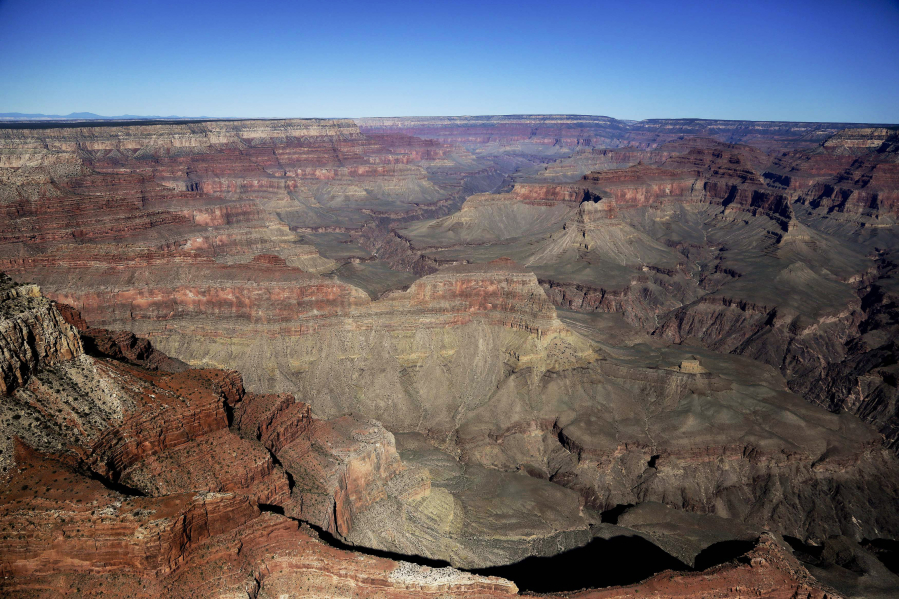TUSAYAN, Ariz. (AP) — President Joe Biden will use his visit to Arizona on Tuesday to formally announce a national monument designation for the greater Grand Canyon, making Native American tribes’ and environmentalists’ decades-long vision to preserve the land a reality.
Biden is expected to announce plans for a new national monument to preserve about 1,562 square miles (4,046 square kilometers) just outside Grand Canyon National Park, national climate adviser Ali Zaidi confirmed. It will mark the Democratic president’s fifth monument designation.
Tribes in Arizona have been pushing Biden to use his authority under the Antiquities Act of 1906 to create a new national monument called Baaj Nwaavjo I’tah Kukveni. “Baaj Nwaavjo” means “where tribes roam,” for the Havasupai people, while “I’tah Kukveni” translates to “our footprints,” for the Hopi tribe.
Arizona is a key battleground state that Biden won narrowly in 2020, becoming the first Democrat since Bill Clinton in 1996 to carry it. And it’s one of only a few genuinely competitive states heading into next year’s election. Winning Arizona would be a critical part of Biden’s efforts to secure a second term.
Later Tuesday, Biden will fly to New Mexico, considered safe for Democrats in 2024, and he will visit the Republican stronghold of Utah as part of his western swing later in the week.
Campaign politics aside, tribes and environmentalists for decades have been trying to safeguard the land north and south of Grand Canyon National Park, while Republican lawmakers and the mining industry tout the economic benefits and raise mining as a matter of national security.
The designation is a reminder of a “new era” in which collaboration and stewardship with tribes is valued, said U.S. Interior Secretary Deb Haaland, the first Native American cabinet secretary.
“It will help ensure that indigenous people can continue to use these areas for religious ceremonies, hunting and gathering of plants, medicines and other materials, including some found nowhere else on Earth,” said Haaland, who recently visited the Havasupai Indian Reservation. “It will protect objects of historic and scientific importance for the benefit of tribes, the public and for future generations.”
Biden arrived Monday evening at Grand Canyon National Park Airport and was greeted by Democratic congressmen Raúl Grijalva and Ruben Gallego. Biden embraced them when he got off Air Force One, and the trio chatted for a few minutes. Grijalva, who serves on the House Natural Resources Committee, has repeatedly introduced legislation to create the monument.
The president will be speaking in an area that is between Pinyon Plain Mine, which is being developed and has not opened, and Red Butte, a site culturally significant to the Havasupai and Hopi tribes.
Representatives of various northern Arizona tribes have been invited to attend Biden’s remarks. Among them are Yavapai-Apache Nation Chairwoman Tanya Lewis, Colorado River Indian Tribes Chairwoman Amelia Flores, Navajo President Buu Nygren and Havasupai Tribal Councilwoman Dianna Sue White Dove Uqualla. Uqualla is part of a group of tribal dancers who will perform a blessing.
“It’s really the uranium we don’t want coming out of the ground because it’s going to affect everything around us — the trees, the land, the animals, the people,” Uqualla said. “It’s not going to stop.”
The Interior Department, reacting to concerns over the risk of contaminating water, enacted a 20-year moratorium on the filing of new mining claims around the national park in 2012.
Existing mining claims will not be affected by this designation, senior Biden administration officials countered. Furthermore, the monument site encompasses around 1.3% of the nation’s known and understood uranium reserves. Officials say there are significant resources in other parts of the country that will remain accessible.
A U.S. Geological Survey in 2021 found most springs and wells in a vast region of northern Arizona known for its high-grade uranium ore meet federal drinking water standards despite decades of uranium mining.
In 2017, Democratic President Barack Obama backed off a full-on monument designation. The idea faced a hostile reception from Arizona’s Republican governor and two senators. Then-Gov. Doug Ducey threatened legal action, saying Arizona already has enough national monuments.
Opponents of establishing a monument have argued it won’t help combat a lingering drought and could prevent thinning of forests and stop hunters from keeping wildlife populations in check. Ranchers in Utah near the Arizona border say the monument designation would strip them of privately owned land.
The landscape of Arizona’s political delegation has since changed considerably. Gov. Katie Hobbs, Democratic Sen. Mark Kelly and Sen. Kyrsten Sinema, an independent, are all on board. Hobbs, a Democrat, has openly urged Biden to issue a designation. In a letter sent to Biden in May, Hobbs claimed that she heard from people across the political spectrum, including sporting groups and outdoor groups, in support of a monument.
Mining companies and the areas that would benefit from their business remain vehemently opposed. Buster Johnson, a Mohave County supervisor, said the monument proposal feels solely politically driven and there should have been another hearing on the matter. He doesn’t see the point of not tapping into uranium and making the country less dependent on Russia.
“We need uranium for the security of our country,” Johnson said. “We’re out of the game.”
No uranium mines are operating in Arizona, although the Pinyon Plain Mine just south of Grand Canyon National Park has been under development for years. Other claims are grandfathered in. The federal government has said nearly a dozen mines within the area that has been withdrawn from new mining claims could still potentially open, even with the monument designation, because their claims were established before 2012.
After Arizona, Biden will go on to Albuquerque on Wednesday, where he will talk about how fighting climate change has created new jobs. During a visit to Salt Lake City on Thursday, the president will mark the first anniversary of the PACT Act, which provides new benefits to veterans who were exposed to toxic substances. He’ll also hold a reelection fundraiser in each city.



